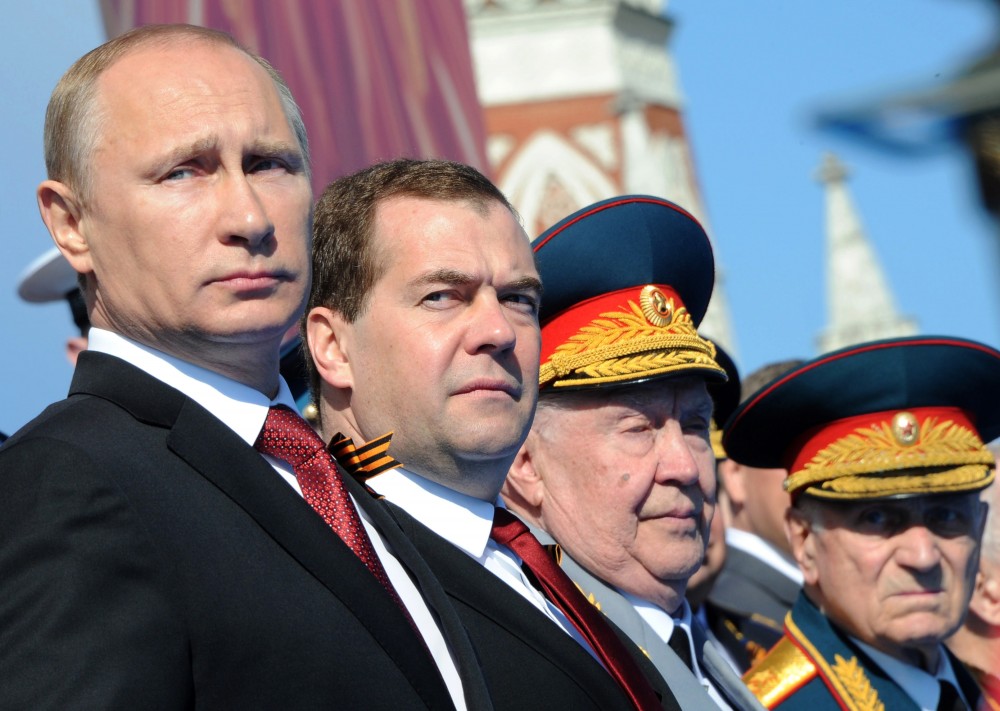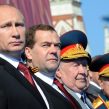
Russia Celebrates Victory and Creeps Into a New War
Publication: Eurasia Daily Monitor Volume: 11 Issue: 88
By:

Tanks and missiles rolled as usual through Moscow’s Red Square on May 9, marking Victory Day against Nazi Germany. In Russia, this commemoration has changed over the last decade from a moment of reflection on the great sacrifice that secured the destruction of Hitlerism to a staged celebration of triumphant militarism. And this year, May 9 has acquired even a higher degree of jingoist fervor as the glorification of past victories was blended with rejoicing over the great achievement of adding Crimea to the Russian Federation. Pointedly, President Vladimir Putin rushed from the Kremlin to Sevastopol to preside over the parade in this newly-gained “possession” (https://president.kremlin.ru/news/20990).
In order to make the show of military muscle more impressive, an exercise of strategic forces was staged on May 8, and Putin observed from a brand new command center the picture-perfect launches of missiles and anti-missile batteries (https://lenta.ru/news/2014/05/08/putin/). No new weapon systems were involved, but the old Soviet designs proved their reliability; for instance, the Podolsk strategic submarine (Delta III class) had not seen action with the Pacific Fleet for ten years, but came out of its semi-retirement usefully for this occasion (https://www.gazeta.ru/politics/2014/05/08_a_6023365.shtml).
This demonstrative militarism stands in sharp contrast to the peaceful intentions declared by Putin last Wednesday at his meeting with Didier Burkhalter, the president of the Swiss Confederation, who is also the chairman of the Organization for Security and Cooperation in Europe (OSCE). Putin’s promise to withdraw troops from the immediate vicinity of Ukraine’s borders is open to doubt, but the release of the OSCE observes who had been held hostage in Slovyansk for a week, was a tangible good-will gesture (Kommersant, May 7). This back-pedaling has undercut the propaganda offensive, leading some “patriotic” opinion-makers to lash out against the procrastinations and decry the “loss of tempo” in the Ukrainian crisis (Izvestia, May 4). Other commentators ascribed to Putin a deeper strategic reading of the situation in eastern Ukraine, which is not yet quite ripe for secession (Moskovsky Komsomolets, May 7).
It is probable that the master of Russian politics is simply at a loss about the no-win dilemma of intervention in or disengagement from the riotous Donetsk and Luhansk regions. He is likely also worried about losing control over the para-militaries of different criminal backgrounds operating there, particularly after the tragic clashes in Odessa on May 2 (https://slon.ru/russia/smena_taktiki_putina_ispug_ili_kholodnyy_raschet-1095597.xhtml). Civil wars are extremely difficult to control, and the fierce armed clashes in Mariupol on May 9 established for a fact that Ukraine is indeed experiencing a chaotic and spasmodic civil war (https://newsru.com/world/10may2014/mariupol3.html). The government in Kyiv cannot stop its order-enforcement operations in the eastern regions, because it needs to restore governability before the presidential elections scheduled for May 25. And Moscow cannot stop supporting armed separatists, because it needs to derail the elections. So the spiral of escalation continues.
Seeking to check this dynamic, French President Francois Hollande invited Putin to attend the ceremony commemorating the 70th anniversary of the allied landing in Normandy on June 6; and the painfully isolated Russian leader jumped at the opportunity (https://ria.ru/world/20140508/1007003951.html). He may presume that the informal summit would weaken the European Union’s resolve to enforce new sanctions, while the European politicians, anxiously herded by German Chancellor Angela Merkel, hope to create for him an incentive to stay on the de-escalation track and let a new Ukrainian president gain a legitimate mandate after the scheduled May 25 elections (https://newsru.com/world/10may2014/sanctionsnew.html). This may be a hope too far—particularly since the EU added several new Russian officials to its sanctions list on Monday, May 12 (https://www.dw.de/eu-foreign-ministers-expand-sanctions-on-russia-diplomats-say/a-17629762). Moreover, the rolling program of targeted sanctions has already inflicted more damage to Russia’s economy than the Kremlin is prepared to admit. The main impact is in inducing deepening uncertainty and stimulating massive capital flight, which turns the forthcoming St. Petersburg Economic Forum into a farce (https://echo.msk.ru/programs/personalno/1316164-echo/#element-text). Neither market reforms nor rigid mobilization is a feasible option for the regime shaped by all-penetrating bureaucratic corruption, but presiding over an economic stagnation is also a recipe for political disaster.
Putin has performed a smart tactical maneuver by playing into the hands of those business-political lobbyists in the West who profess that Ukraine is not worth a confrontation. The political initiative, nevertheless, remains in the hands of the United States’ President Barack Obama. The US White House leads the coalition effort at deterring Moscow from taking the next step up the escalation ladder and turning its “special operations” in eastern Ukraine into a military intervention. This deterrence strategy needs to be seriously strengthened in the next two weeks because while pseudo-referendums in Slavyansk and Mariupol were a pathetic sham, the presidential elections could become a real watershed in rescuing Ukraine from state failure (Novaya Gazeta, May 9). Putin is a designated loser in this plan for extinguishing the brushfires of civil war, but he has maneuvered Russia into a situation where the price of the next “victory” might be raised to an unacceptable level. Nearly half of Russians now see civil war as the most probable outcome of the Ukrainian crisis (up from 22 percent in early March). But support for a “peace-making” intervention is dwindling (https://www.levada.ru/06-05-2014/rossiyane-ob-ukrainskikh-sobytiyakh).
Given the choice between moving troops into eastern Ukraine and manipulating conflicts there by other means, Putin is most likely to opt for the latter. However, he cannot accept the failure of such manipulation and the prospect of stabilization. Any reconstituted Ukrainian state would see Russia as an existential threat and act accordingly, so the deal of “winning Crimea, but losing Ukraine” is the best Putin can possibly achieve; and it is not an attractive proposition at all. Keeping Ukraine down and the North Atlantic Treaty Organization (NATO) out is a tall order. Whereas shutting down the gas pipelines—next in Putin’s sights—is not enough to fulfill it. The longer Putin procrastinates with a decisive military advance into Luhansk and Donetsk, the riskier such an act of aggression becomes. But at the same time, the sharper grows the need to break the trend of losing slowly. The urge to do something—incited by all sorts of conflict entrepreneurs—is typically an outset of a blunder, and the sum total of mistakes already committed in the course of the Ukrainian calamity requires Moscow’s next move to be extra-large to cover them all. Russia has a lot to lose in the unnecessary war, but Putin may feel exactly the opposite.




